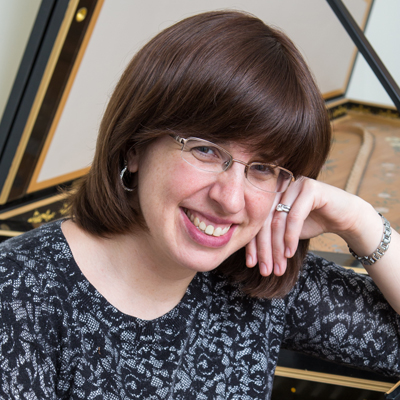Without Sara Levy, the legacy of Johann Sebastian Bach may have been lost
We are all familiar with the music of Johann Sebastian Bach (1685–1750), but not many of us may have heard of Sara Levy (1761–1854), a German-Jewish performer, patron, and collector who preserved the music of the past and shaped the music of the future. Although without her, the legacy of Bach and his contemporaries might have been lost, her role in the formation of German musical history has largely been forgotten—or even willfully ignored—perhaps because of her status as a woman and as a Jew. Dr. Rebecca Cypess, Assistant Professor of Music at Rutgers University, seeks to restore Sara Levy to her place in history, recover her perspective on the music she collected and commissioned, and hear this music—much of it completely unknown today—once again. In the present age, marked by religious conflict, Sara Levy's efforts to forge a common musical tradition accessible to both Christians and Jews serve as an instructive model for tolerance, coexistence, and creative expression.
A student of Johann Sebastian Bach’s eldest son, Wilhelm Friedemann Bach, Sara Levy lived through the period of the Enlightenment and helped cultivate an interest in earlier music at a moment when historicism was just emerging as an important concept. She preserved much of the local Berlin music of previous generations, and later donated her collection to the Sing-Akademie in Berlin, thereby sharing a musical culture that was otherwise forgotten. In addition, Levy was an important leader within Berlin Jewry, advocating increased education and inter-religious socialization. Music was an important instrument of Enlightenment for Levy and her circle.
An active harpsichordist and fortepianist, Dr. Cypess hopes to bring Sara Levy's collection back to life--and to sound--through a series of concerts and recordings of music preserved uniquely in Levy's collection, or music that Levy is known to have commissioned. Already co-editor of a volume of essays (in preparation) on Levy and her world, Dr. Cypess also plans to continue her scholarly work on Levy through a series of articles or a book that situate the activities of this formidable woman as a patron, performer, and collector, within her fascinating cultural and religious environments. Through sound and through word, Dr. Cypess hopes to acquire a more complete picture of the complex interaction among musical, religious, and gender history in the German Enlightenment.
Dr. Cypess’s research focuses on the following questions:
- With much of the music that Sara Levy collected completely unknown today, how does its recovery enrich our understanding of musical culture in the Enlightenment? These are questions that can only be answered through the presentation of concerts and recordings from Levy's archive.
- What impact did Sara Levy's Jewish identity have on her roles as a performer, collector, and patron of music?
- How did her status as a woman shape these musical activities?
- How were her musical activities viewed by her Jewish peers, and how did non-Jewish musicians, including her teacher, Wilhelm Friedemann Bach, regard her?
- What was the relationship between Sara Levy and other key figures in Bach reception in the late 18th century?
- What performance practices did Sara Levy cultivate within her salon and her public performances? How did she view the act of performance in relation to the acts of patronage and collecting?
Bio
Dr. Rebecca Cypess joined the Rutgers faculty in Fall 2012, having served previously as a faculty member in musicology at the New England Conservatory. She has also taught in the department of music at Yale University, at the Yale School of Music, and at Southern Connecticut State University. In her teaching and research, Dr. Cypess specializes in the history, interpretation and performance of music in 17th- and 18th-century Europe. She has published in major journals of her field, including the Journal of the American Musicological Society, Music & Letters, Early Music, The Musical Quarterly, and others; she has also published a series of entries on early modern women in music for Encyclopaedia Britannica, and program notes for such venues as Lincoln Center and the Boston Early Music Festival. In addition to her work as a musicologist, Dr. Cypess is a harpsichordist and fortepianist. Her courses and research projects frequently seek to establish connections between musicology and performance practice.
Dr. Cypess became a researcher because of her teachers: wise, nurturing, passionate people who taught her that thinking creatively about music could be an artform unto itself. Watching her teachers listen attentively, read carefully, think logically, and write elegantly, she grew to respect the work they did and to seek to emulate it herself. This is the kind of relationship she fosters with her own students: one in which teaching, research, and mentorship are inextricably linked.
Dr. Cypess’s first book, Curious and Modern Inventions: Instrumental Music as Discovery in Galileo’s Italy, due to be published by the University of Chicago Press in January, 2016, is on early 17th-century Italian instrumental music and its relationship to other instruments, including clocks and telescopes, that were used as vehicles of invention and discovery. For Dr. Cypess, music presents precisely this potential--it is a means of discovering truths and beauties in the world around us as well as in ourselves.
Even as she worked on music in early modern Italy, Dr. Cypess cultivated an interest in 18th-century music--especially the music of Johann Sebastian Bach and his sons. She has found that the story of Bach's reception in the decades after his death, during the Enlightenment, has been very little understood until now. Part of this story has been, she believes, willfully ignored, because it hinges on the fundamental involvement of a German-Jewish woman, Sara Levy: a difficult truth within a field that was long colored by anti-Semitism. In September, 2014, together with a colleague in Jewish Studies, she co-organized a symposium on Sara Levy at Rutgers; the resulting book will most likely be published by the University of Rochester Press. A Jewish musician and scholar herself, Dr. Cypess has found in Sara Levy a new point of entry for understanding the music of Bach and his sons.
In addition, studying Sara Levy has enabled Dr. Cypess to fuse her two professional roles, which have been largely distinct from one another until now--those of musicologist and performer. A patron, collector, and virtuosic keyboardist, Sara Levy played and commissioned revolutionary music. Retracing her fingers by playing the music she cultivated has helped Dr. Cypess to understand her project in new ways. She has just completed an article and a book chapter dealing with performance practices and the reception of Bach's music in Sara Levy's circle; neither would have been possible without her hands-on engagement with the music at the harpsichord and fortepiano. Through concerts, recordings, and publications, Dr. Cypess hopes to learn about Sara Levy as a complete person, restoring her to her rightful position in German history, Jewish history, and musical history.
Outside of her research, Dr. Cypess loves to spend time with her three children, she also does volunteer work in her community as well as serving on the educational committee at her children’s school.
For more information, visit http://www.masongross.rutgers.edu/music/faculty/rebecca-cypess
In the News
Rutgers
American Musicological Society
The New Jersey Jewish News
Publications
Videos
Awards
American Association of University Women. Short-term Publication Grant, 2015
For completion of Curious and Modern Inventions: Instrumental Music as Discovery in Galileo’s Italy (University of Chicago Press, forthcoming in 2016)
Research Award for the audio recording project “Listening to Sara Levy,” 2014
Hadassah–Brandeis Institute
Major Grant from the New Jersey Council for the Humanities, 2014
Co-recipient (with Nancy Sinkoff). For the conference “Sara Levy’s World: Music, Gender, and Judaism in Enlightenment Berlin,” Rutgers University.
Conference Funding in German Studies from the German Academic Exchange Service (DAAD), 2014
Co-recipient (with Nancy Sinkoff). For the conference “Sara Levy’s World: Music, Gender, and Judaism in Enlightenment Berlin,” Rutgers University.
William H. Scheide Research Grant for research on music in the salon of Sara Levy, 2014
American Bach Society


